Strategic Thought Transformation - The IIPM Think Tank
Strategic Thought Transformation - The IIPM Think Tank
Strategic Thought Transformation - The IIPM Think Tank
You also want an ePaper? Increase the reach of your titles
YUMPU automatically turns print PDFs into web optimized ePapers that Google loves.
S T R A T E G I C I N S I G H T<br />
I believe it does. In an academic paper<br />
that I coauthored with my colleague Matthew<br />
Morey (accessible at http://dx.doi.<br />
org/10.1016/j.jempfin.2005.10.001) we<br />
find evidence that some aspects of the manager’s<br />
education matter while others do<br />
not. Forming a sample of 518 mutual fund<br />
managers that hold undergraduate degrees<br />
from U.S. schools, we find that mutual funds<br />
managed by those that hold MBAs from top<br />
business schools outperform other actively<br />
managed mutual funds. However, mutual<br />
fund performance is unrelated to whether<br />
the manager holds a CFA or a non-business<br />
graduate degree. Other researchers have<br />
found that performance is positively related<br />
to the quality of the manager’s undergraduate<br />
school and whether the manager holds an<br />
MBA. While this issue has only recently begun<br />
to receive attention, these results clearly<br />
suggest that mutual fund performance is positively<br />
related to at least some measures of the<br />
quality of the fund manager’s education.<br />
Why should education matter<br />
Why is it that the quality of the fund manager’s<br />
education influences their performance<br />
One explanation is that top business<br />
schools provide a better education than<br />
lower quality schools. Because of their superior<br />
education, managers that received<br />
degrees from superior schools tend to have<br />
better investing skills, which results in them<br />
outperforming their rivals. Because investing<br />
requires significant skills, particularly<br />
technical skills, the quality of the education<br />
that managers receive may be crucial.<br />
Note, however, that we find no evidence<br />
that mutual fund performance is related to<br />
whether the manager holds a CFA, though<br />
CFAs require significant technical skills.<br />
A second explanation is that managers<br />
that receive degrees from top business schools<br />
are more intelligent. After all, simply getting<br />
accepted into a top MBA program requires<br />
excellent scores on aptitude tests, and significant<br />
intelligence is required to complete<br />
the degree successfully. <strong>The</strong>ir superior intelligence<br />
may allow them to make superior<br />
investment decisions, which leads them to<br />
outperform their rivals.<br />
A third explanation is that managers from<br />
top B-Schools form important relationships<br />
with their peers that aid them while managing<br />
funds. <strong>The</strong>se social connections may give<br />
managers access to superior investment opportunities<br />
that are unavailable to managers<br />
without such social connections.<br />
A fourth explanation is unrelated to education,<br />
social connections, or intelligence.<br />
Instead, superior funds may tend to hire managers<br />
from superior schools; hence, managers<br />
from top business schools may do better<br />
because they are more likely to get jobs at<br />
better funds.<br />
Of course, all of the above explanations<br />
may play a role in explaining why the quality<br />
Managers from<br />
top B-Schools<br />
form important<br />
relationships with<br />
their peers that aid<br />
them while<br />
managing funds<br />
of the business school from which the manager<br />
received his or her MBA matters. Regardless,<br />
it does appear that the quality of the fund<br />
manager’s education provides some insight<br />
into the fund’s potential performance.<br />
Conclusion<br />
I’ve presented evidence which suggests that,<br />
on average, a mutual fund whose manager<br />
holds an MBA from a top business school will<br />
outperform other managers. <strong>The</strong>se findings<br />
may be driven by the quality of the education,<br />
social connections, or job opportunities<br />
available to those completing a degree from<br />
top business schools, may be related to the<br />
intelligence of an individual that is accepted<br />
into, and completes, a top MBA program, or<br />
may be due to a combination of the above.<br />
Some caveats are in order. First, other factors<br />
are equally, if not more important, hence<br />
basing decisions solely on the manager’s education<br />
is not advisable. Second, the existing<br />
empirical research is primarily focused on US<br />
mutual funds; hence these findings may not<br />
be fully applicable to Indian mutual funds.<br />
Indeed, one should always be cautious when<br />
extrapolating across countries and market segments.<br />
Third, past results do not necessarily<br />
reflect the future; factors that influenced<br />
performance in the past do not automatically<br />
influence performance in the future. Clearly,<br />
however, the evidence of a relation between<br />
the quality of the mutual fund manager’s education<br />
and performance represents a broad<br />
insight that a sophisticated investor would<br />
be unwise to ignore.<br />
Reference<br />
Anand, Shefali, 2006, Mutual-Fund Hot Spot:<br />
India; U.S. and Other Foreign Firms Rush Into<br />
the Booming Market Following Regulatory<br />
Changes, <strong>The</strong> Wall Street Journal (Eastern<br />
edition), March 10, pg. C.1.<br />
See Wermers, Russ, 2000, “Mutual Fund<br />
Performance: An Empirical Decomposition<br />
into Stock Picking talent, style, transactions<br />
costs and expense,” Journal of Finance 55,<br />
1655-1695 and Morey, Matthew R. and Gottesman,<br />
Aron A., 2006, “Morningstar Mutual<br />
Fund Ratings Redux,” Journal of Investment<br />
Consulting, forthcoming.<br />
See Gottesman, Aron A. and Morey, Matthew<br />
R., “Manager Education and Mutual<br />
Fund Performance,” Co-authored with M.<br />
Morey, Journal of Empirical Finance 13 2,<br />
2006, pp. 145-182.<br />
Ibid. See Chevalier, Judith and Glenn Ellison,<br />
1999, “Are Some Mutual Fund Managers<br />
Better than Others Cross-Sectional Patterns<br />
in Behavior and Performance,” Journal<br />
of Finance 54 3, 875-899 and Golec, Joseph<br />
H., 1996, “<strong>The</strong> Effects of Mutual Fund Managers’<br />
Characteristics on <strong>The</strong>ir Portfolio Performance,<br />
Risk and Fees,” Financial Services<br />
Review 5, 133-148.<br />
Aron A. Gottesman is an Associate Professor<br />
in the Department of Finance and Graduate<br />
Economics at the Lubin School of Business,<br />
Pace University, located in Manhattan, New<br />
York, USA. He has published academic article<br />
and books on finance education, financial<br />
markets and intermediation, corporate finance,<br />
and the history of economic thought.<br />
He can be reached through his website, www.<br />
arongottesman.com.<br />
44<br />
STRATEGIC INNOVATORS<br />
An <strong>IIPM</strong> Intelligence Unit Publication



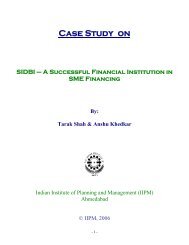
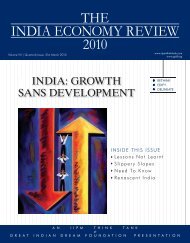
![[Feb 2008, Volume V Annual Issue] Pdf File size - The IIPM Think Tank](https://img.yumpu.com/43961117/1/190x245/feb-2008-volume-v-annual-issue-pdf-file-size-the-iipm-think-tank.jpg?quality=85)
![[June 2008, Volume V Quarterly Issue] Pdf File size - The IIPM Think ...](https://img.yumpu.com/41693247/1/190x245/june-2008-volume-v-quarterly-issue-pdf-file-size-the-iipm-think-.jpg?quality=85)

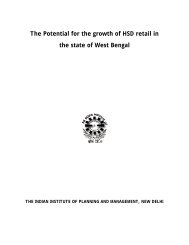
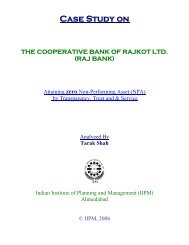

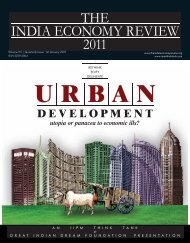
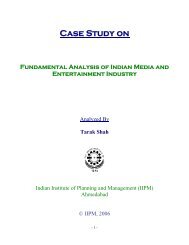
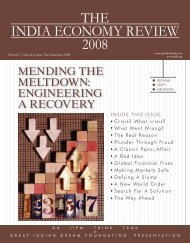
![[Dec 2007, Volume 4 Quarterly Issue] Pdf File size - The IIPM Think ...](https://img.yumpu.com/29766298/1/190x245/dec-2007-volume-4-quarterly-issue-pdf-file-size-the-iipm-think-.jpg?quality=85)
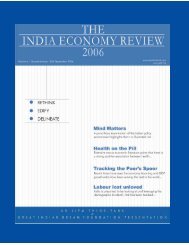
![[Volume VI | Quarterly Issue: 31st May 2009] Pdf File size](https://img.yumpu.com/27796051/1/190x245/volume-vi-quarterly-issue-31st-may-2009-pdf-file-size.jpg?quality=85)